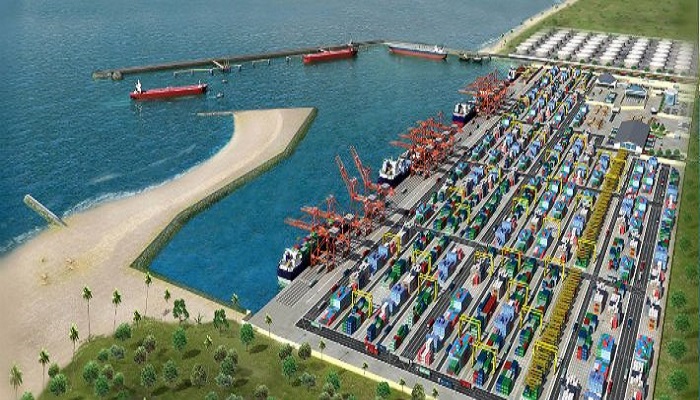Kudos on delivery of Lekki Deep Sea Port
The recent handover of the Lekki Deep Sea Port to its owners marks a significant milestone in Nigeria’s maritime development and a boost to the nation’s trade and industrial growth. The handover followed the completion of the construction work in record time, lasting from June 2020 to October 2022. Built at a cost of $1.5 […]

Lekki Deep Seaport
The recent handover of the Lekki Deep Sea Port to its owners marks a significant milestone in Nigeria’s maritime development and a boost to the nation’s trade and industrial growth. The handover followed the completion of the construction work in record time, lasting from June 2020 to October 2022.
Built at a cost of $1.5 billion, the port comes with a lot of promise and potential for the nation. It is reputed to be the deepest in the West African sub-region and has the capacity to employ about 200,000 people. With a projected holding capacity of 1.2 million 20-foot equipment units, Nigeria is being positioned as the undisputed maritime hub of the sub-region.
Defence Intelligence officers’ wives seek support for husbands
PDP crisis: I’m on same page with Wike’s camp – Bauchi gov
It also offers opportunities for revenue generation for both the Lagos State and federal governments, with estimates already indicating that as much as $361 billion could be generated from it.
The port comes as a relief to the congested Apapa Ports, which for several years have served as the only active seaports in the country.
The state of the Apapa Ports has put extreme difficulty on operators in the Nigerian maritime industry in the last couple of years, with the cost of evacuating cargo from there rising several times over.
It is, therefore, hoped that the coming of the Lekki Port would help to restore normalcy to these ports.
As an economic hub, the port offers an extension of development to that part of Lagos State. Interestingly, it is located within the axis of the Lagos Free Zone in the Ibeju Lekki area, which has appropriately been described as “New Lagos”.
As Governor Babajide Sanwo-Olu restated at the handover ceremony, that zone was specifically designed to attract investments into the state. The area is therefore expected to soon witness a blitz of developmental projects, including roads that are urgently needed for the evacuation of cargo from the port.
Indeed, the need to avoid the Apapa experience featured prominently in discussions surrounding the Lekki port’s construction. Stakeholders in the industry made it clear that the new facility must not be allowed to suffer the same fate as the Apapa port.
It was therefore quite heartwarming that Governor Sanwo-Olu, on that occasion, restated his administration’s commitment to the delivery of the road network in that area, for the unencumbered evacuation of goods from there.
It is also instructive that the new port is located within the same zone as the Dangote Refinery and Dangote Fertilizer Plant, two strategic projects that are set to impact positively on the Nigerian economy.
The timely completion of the project is a good example of coordination in project planning. It would have been an aberration if these Dangote Refinery and Fertilizer plants were to commence operations without the platform for the export of their products being ready.
The origin and development of this project deserve some commendation. It was initiated by the Lagos State government and assisted by the federal government. Its successful completion bears testimony to the tenacity of the promoters of the project, given that the construction work kicked off in June 2020, when the whole world was on lockdown occasioned by the COVID-19 pandemic.
The project should also be commended for its strategic location within the Lagos Free Zone. It is one thing to situate a business enterprise in a particular location, but it is entirely another to ensure that the chosen location is such that it can enable the project to achieve optimum performance.
Daily Trust opines that situating it within the precincts of the Dangote plants and other enterprises that will sprout around the free trade zone will enable each of them to reap the benefits of such an agglomeration.
This should be encouraged in Nigeria’s quest for capacity building and the search for industrialisation. Managers of the nation’s economy must identify or build on already identified industrial clusters for the rapid industrialization of the country through the co-location of companies operating in similar sectors that can therefore share facilities, services, and raw materials.
While Daily Trust commends the take-off of the Lekki Deep Sea Port, we are nevertheless concerned by the fate of the inland dry ports that were started in the northern part of the country some years ago but have yet to fully take off. These include the Funtua Inland Dry Port in Katsina State, Dala Inland Dry Port, Kano State, and Baro Inland Dry Port in Niger State, and above all the dredging of River Niger, a project that is as old as Nigeria, and supposedly still ongoing.
We find it disheartening that 15 years after the late President Yar’adua re-awarded the dredging project and seemed serious about ensuring it was completed during his administration, those projects have still to be completed. Recently, the Nigerian Shippers’ Council disclosed that it was in search of investors for these projects, including financial institutions.
Given the role that ports play in the even distribution of the gains of economic development of an economy, we call on the relevant authorities to fast-track the development of these and other inland ports in the region to enable it to benefit from the impact of the facilities in job creation, and overall economic development.
